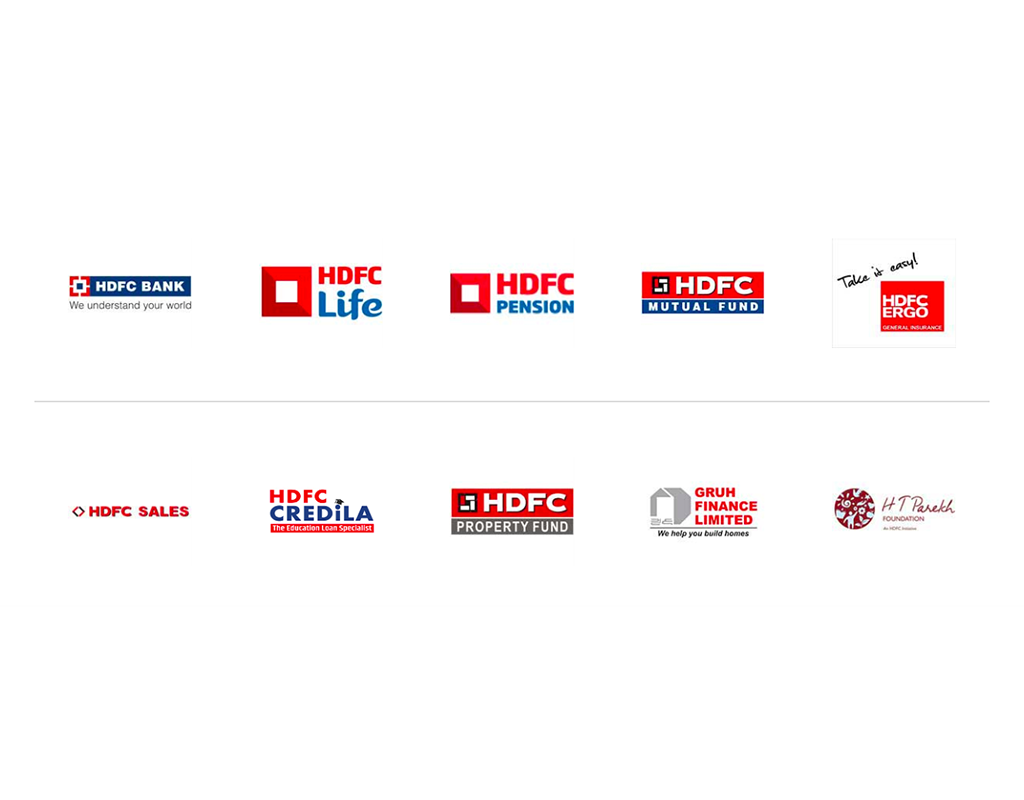
HDFC Group History & Major Events
The story of HDFC began with the incorporation of ‘Housing Development Finance Corporation Ltd as India’s first retail housing finance company in the year 1977.
In order to provide long-term finance to middle & lower income individuals as well as corporations for the construction & purchase of residential houses in India, ‘Industrial Credit and Investment Corporation of India’ (ICICI) promoted HDFC
The equity shares listed on BSE in 1978 and on NSE in the year 1996.
1981:
HDFC promoted its wholly owned subsidiary HDFC Developers.
1988:
Further in the year 1988, the company co-promoted ‘Gujarat Rural Housing Finance Corporation Ltd’ (GRUH Finance), ‘Housing Promotion & Finance Corporation Ltd’ (now SBI Home Finance), ‘Can Fin Homes Ltd’, ‘Infrastructure Leasing and Financial Services’ (IL&FS) and ‘Credit Rating Information Services of India Ltd’ (CRISIL) along with leading financial institutions & commercial banks of India.
1990:
In the year 1990 the Corporation in association with the United Nations Centre for Human Settlements promoted the Coalition of Housing Finance Institutions in Asia.
The company was the only company providing retail housing finance till late 1980s. The company followed a simple business model of borrowing wholesale funds & further lending them to the retail customers, from where it could earn a spread of ~2%. The company received funding from both the Domestic as well as from International markets. At the domestic front the funding primarily came from commercial banks, state insurance companies and from Unit Trust of India. On the other hand internationally HDFC had managed to raise funds from the World bank, International Finance Corporation & United States Agency for International Development (USAID) under guarantees given by Government of India as well as the Housing guarantee programme.
But in 1990 due to the Gulf War, Indian economy suffered; leading RBI to raise interest rates sharply thus eroding the spread of HDFC. When raising funds at lower rates became difficult, HDFC thought of finding new avenues to raise funds. The company found an opportunity when the Indian Government opened up the banking sector to private players in 1993. During the year, HDFC jointly with ‘General Electric Capital Corporation’ of US promoted ‘Countrywide Consumer Financial Services Ltd’ for providing consumer finance.
For the bank license, the threshold was a minimum capital requirement of Rs 1 billion and HDFC’s net worth was around Rs 3 billion. Amongst 40 applicants for the banking license, HDFC was the first one to get allotment of a license.
1994:
‘HDFC Bank’ incorporated on August 30th 1994 under a strategic alliance between HDFC & UK-based ‘NatWest Markets’.
1995:
In March 1995, HDFC Bank launched an IPO of Rs 5 crore oversubscribed up to 55 times. The shares of the bank listed on BSE on 19th May 1995 & further in NSE on 8th November 1995. During the year, HDFC along with ‘IL&FS’ and ‘Colliers Jardine Asia Pacific Ltd’ jointly promoted ‘Colliers Jardine India Property Services Ltd’. Further during the year, ‘Standard Life Assurance Co’ of UK signed an MOU with HDFC for selling Life Insurance in India.
1997:
The group moved in International market in the year 1997 and incorporated ‘Delta Brac Housing Finance Corporation Ltd’ in Bangladesh.
1999:
HDFC invested in a new housing finance company in Sri Lanka.
Also in 1999, HDFC established ‘HDFC Asset Management Co’ (HDFC AMC) as the asset management arm of the company, wherein, Standard Life Investments acquired 26% stake in the year 2001.
2000:
In February 2000, Times Bank Ltd owned by Bennett Coleman & Co. amalgamated with HDFC Bank. HDFC Bank in the month of April formed a joint venture of ‘HDFC Ltd’ with ‘Indocean eSecurities Holdings Ltd’ for providing stock broking services to its clients. The JV company was ‘HDFC Securities Ltd’.
Moving ahead in June 2000, HDFC acquired the entire stake in ‘Hometrust Housing Finance Company Ltd’ which was a subsidiary of Gujarat Ambuja Cement Ltd for Rs 50.01 crores. Also, it acquired 26% stake in ‘GRUH Finance’ from Gujarat Ambuja Cement Ltd for Rs 9.99 crores where it already held 28% stake, thus, taking its total stake in GRUH Finance to 54%.
HDFC Standard Life Insurance Company Ltd incorporated as a joint venture between ‘HDFC’ & ‘Standard Life Aberdeen Plc’ on 14th August 2000 and received certificate from IRDAI to undertake life insurance business on 23rd October 2000. HDFC Standard Life Insurance business was the first private sector life insurer to get an insurance license.
In the year 2000, HDFC formed a joint venture with Mahindra & Mahindra group as ‘propertymartindia.com’ for providing real estate services; while another JV formed between HDFC & TCS known as ‘Intelenet Global Services Ltd’ for IT-enabled services. HDFC signed a JV with ‘Standard Life Investments’ for promoting HDFC Mutual Fund.
2001:
In the year 2001 HDFC in association with State Bank of India, Dun & Bradstreet and Trans Union International Inc. (TU) promoted Credit Information Bureau (India) Ltd.
2002:
HDFC made a joint venture with Chubb Corporation USA and promoted HDFC-Chubb General Insurance Company Ltd for non-life insurance.
2003:
May 2003; HDFC signed a Technical Service Contract with Egyptian American Bank for providing technical assistance for setting up Egypt’s first private sector led mortgage finance company ‘Egyptian Housing Finance Company’. In September 2003, HDFC Bank & HDFC Ltd entered into an agreement providing for HDFC bank to sell Housing Loan product of HDFC Ltd.
2004:
In 2004, ‘HDFC Standard Life Insurance Ltd’ entered into a distribution tie-up with Saraswat Co-operative Bank Ltd & HDFC Bank. HDFC bought out the 50% stake of TCS in ‘Intelenet Global Services’ for Rs 161 crores in July and in less than a month sold the 50% stake for Rs 164 crores to ‘Barclays’, a UK based financial services firm.
2005:
In September 2005, HDFC Bank increased its stake from earlier 29.5% to 55% in ‘HDFC Securities Ltd’.
2007:
In May 2007, HDFC acquired the entire 26% of the equity held by Chubb Global Financial Service Corporation USA in ‘HDFC Chubb General Insurance Company Ltd’. The same stake was sold to Ergo (the insurance arm of Germany’s reinsurance major Munich Re) and the JV company came to be known as ‘HDFC Ergo General Insurance Ltd’.
In June 2007 consequent to a preferential offer by HDFC Bank Ltd, the Corporation acquired 1,35,82,000 shares of HDFC Bank for a consideration of Rs. 1390.11 crore. In October 2007 HDFC bought 9.9% shares in HDFC AMC from its JV partner for Rs 1,836.46 crore. Thus, raised HDFC’s total shareholding to 60% where as Standard Life’s stake reduced to 40%.
During 2007, ‘HDB Financial Services’ incorporated as the NBFC arm of HDFC Bank Ltd with interests in Lending & BPO services.
On the other hand during the year HDFC divested 7.15% of its equity holding in HDFC-SL in favour of Standard Life Assurance Company UK. Also they divested their entire shareholding in Intelenet Global Service Pvt Ltd to ‘Blackstone’ for Rs 445 crore.
2008:
In February 2008, HDFC Bank Ltd’s board approved the acquisition of ‘Centurion Bank of Punjab’ for Rs 9,510 crore. The shareholders of Centurion Bank got one share in HDFC Bank for every 29 shares held by them. The merger strengthened HDFC Bank’s distribution network in North & South India.
2010:
Year 2010; HDFC acquired ~41% stake in ‘HDFC Credila Financial Services P Ltd’ from DSP Merrill Lynch Capital Ltd for $2.2 million (~Rs 10 crore), thus increasing its total stake to 51%.
2011:
During 2011, HDFC along with Beacon India Private Equity Fund, Cartica Capital, Faering Capital, Gaja Capital Partners, Norwest Venture Partners and Samara Capital bought a combined stake of over 30% in ‘Ratnakar bank’.
In July 2011, HDFC Bank announced sub-division of its stocks in the ratio of 1:5 in order to encourage wider retail participation.
2013:
Further in the year 2013, HDFC Mutual Fund signed a definitive agreement to acquire all the 8 schemes of Morgan Stanley’s mutual fund in India with assets worth Rs 3,290 crore.
2015:
With Indian Government allowing up to 49% FDI in the Insurance sector in the year 2015 HDFC sold 9% of its stake in HDFC Standard Life Insurance to its JV partner ‘Standard Life’ for Rs 1700 crore in April 2016. This led to HDFC’s stake falling to 61.65% while Standard Life’s stake reached 35%.
2016:
In the month of June in 2016, HDFC sold its 22.9% stake in HDFC Ergo General Insurance, after which HDFC’s stake fell to 50.73% while its JV partner’s stake increased to 48.74%.
HDFC’s Board of Directors at its meeting held on 27 July 2016 granted in-principle approval for the amalgamation of five wholly-owned subsidiaries viz. Grandeur Properties Private Limited Haddock Properties Private Limited Winchester Properties Private Limited Pentagram Properties Private Limited and Windermere Properties Private Limited into HDFC. The area of business of these five subsidiaries is receiving of rental income on commercial properties.
In 2016, HDFC Standard Life Insurance tried acquiring ‘Max Life Insurance Company Ltd’ but the proposed merger was rejected by IRDAI owing to the structural issues of the proposed merged entity & its non-compliance with the provisions of Insurance Act, 1938.
2017:
On 1 June 2017 HDFC‘s wholly-owned subsidiary HDFC Investments Limited made an investment of ~$1.5 million by subscribing to 15% of the share capital of First Housing Finance (Tanzania) the first housing finance company to be set up in Tanzania. During the years HDFC Standard Life Insurance established its first international subsidiary in UAE to operate reinsurance business.
In August 2017, HDFC Ergo General Insurance completed the merger of L&T General Insurance, and marked India’s first amalgamation in the Non-Life Insurance sector. HDFC acquired L&T General Insurance for Rs 551 crores. The market share of HDFC Ergo was 4.6% prior to amalgamation which increased to 4.9% after the merger of the companies.
The shares of ‘HDFC Standard Life Insurance’ company listed on BSE & NSE in November 2017, over-subscribed by 4.89 times.
On 21 December 2017 HDFC approved the sale of 100% of its equity share capital in ‘HDFC Developers Limited’ which run the HDFC Red platform and ‘HDFC Realty Limited’ a real estate brokerage platform to ‘Quikr’ for total consideration of Rs. 101.99 crore and Rs. 254.98 crore respectively. HDFC also acquired an equity stake in ‘Quikr India Private Limited’.
2018:
The shares of HDFC Asset Management Company listed on July 27, 2018, over-subscribed 83.05 times. HDFC AMC has been the largest fund house in terms of equity-oriented AUM since Q4FY11 with a market share of ~14% on the basis of total AUM & market share of 16.8% on the basis of actively managed Equity-oriented AUM.
In August 2018, HDFC Ltd announced the acquisition of 25% stake in ‘Good Host’ from ‘Manipal Integrated Services P Ltd’ for Rs 69.5 crore. The company is in the business of managing student housing facilities in Jaipur & Udupi.
2019:
The name of ‘HDFC Standard Life Insurance Ltd’ got changed to ‘HDFC Life Insurance Ltd’ in January 2019.
The business of Apollo Munich is proposed to be merged with HDFC Ergo General Insurance. In Apollo Munich Health, ‘Munich Re’ owns 49% while in HDFC Ergo, ‘Ergo International AG’ another subsidiary of the Munich Re, has been holding 49% stake since 2008.
‘Gruh Finance’ is proposed to be amalgamated with Kolkata based ‘Bandhan Bank’ subject to various approvals. In order to comply with the RBI requirement HDFC sold 6.10% stake for Rs 1327.89 crore in May 2019 and 4.22% stake in June for Rs 899 crore. HDFC is selling stake such that it holds up to 9.9% stake post-amalgamation in the paid-up capital of Bandhan Bank. In the coming time, HDB Financial Services is expected to come up with its IPO, the shares of the company are being valued at over Rs 80,000 crore in the grey market.
Current HDFC Group Structure
Click to enlarge the detailed group structure:

Men behind HDFC’s creation
In the era before the existence of HDFC, owning a home was a distant dream for majority of the Indian middle class families. The dream of owning a home for many could be realised only post retirement, when one get a lump sum amount in the form of Provident Fund & Gratuity. There was no presence of NBFCs; Banks could not lend because ‘housing’ did not fall into the category of Industry; getting a loan for constructing house was impossible.
(A) Hasmukh Thakkordas Parekh
Hasmukh Thakkordas Parekh founded Housing Development Finance Corporation in 1977 after 2 failed attempts of forming a housing finance company. Famously called as HT Parekh or HTP, his dream of starting a housing finance based company realised after his retirement as the chairman of ICICI. He laid another milestone by setting up HDFC without any financial assistance from the Government of India. HTP not only formed HDFC but also was the major driving force behind the conceiving of Gruh Finance.
In an environment where the income levels of people were low, lending against future income was risk taking. But it was HTP’s confidence & trust in the middle class people’s ability to repay made him an entrepreneur. Making available housing finance to the Indian people, he has been credited with the title of ‘Father of Home Finance or Mortgage Lending’.
(B) Deepak Shantilal Parekh
Deepak Shantilal Parekh, the non-executive director of HDFC from 30 years. He started his career with Ernst & Young Consultancy Services in New York and in 1978 joined HDFC as a Deputy General Manager. He went on to become the Chairman of HDFC in 1993. The housing finance company has expanded tremendously under his vision.
He was the driving force behind the setting up of HDFC Bank Ltd in 1995 for meeting the company’s growing funding requirement. Under his able guidance, HDFC Ltd went forward to promote companies with business interests in Insurance- both Life & General, Asset management, Realty, Capital Market, Financing etc
(C) Aditya Puri
Aditya Puri worked as the CEO of Citibank in 1994 when he was convinced by Deepak Parekh to come and join as the Managing Director of a startup bank- HDFC Bank Ltd promising him complete operational autonomy. Since 1994 Aditya Puri has remained at the helm of HDFC Bank, making him the longest-serving head of a private bank in India. Aditya Puri is credited of constructing India’s biggest bank (in terms of market valuation) from scratch.
(D) Keki Mistry
Keki Mistry, a Chartered Accountant by profession, started his career in 1975 with AF Ferguson & Co. Mistry joined in 1981 and was inducted on to the board of HDFC in 1993. He was appointed as the managing Director of the company in the year 2000 & was promoted to the position of Vice Chairman & Managing Director in the year 2007. In the year 2010, Mistry was appointed as the Vice-Chairman and CEO of the corporation wherein he is responsible for the overall functioning of the corporation.
In July 2018, Deepak Parekh talked for the first time about the succession planning not only for HDFC but also for its group companies. With Aditya Puri’s retirement nearing in October 2020 the bank has started looking for an able administrator to step into Puri’s shoes. In the Chairman’s letter to the shareholders, Deepak Parekh had guided of Keki Mistry continuing as the Vice-Chairman & CEO for 3 years.


To know about our investment advisory services and to place your enquiries: Drop us a mail at – info@pawealth.in or Visit pawealth.in
References: Annual Reports, News Publications, Corporate Announcements, Management Discussions, Analyst Meets & Management Interviews.
Disclaimer: The report only represents personal opinions and views of the author. No part of the report should be considered as recommendation for buying/selling any stock. The report & references mentioned are only for the information of the readers about the industry stated.





4 Responses